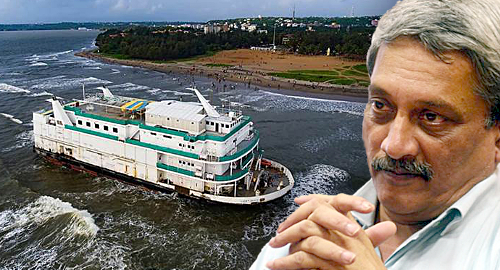 Goa’s chief minister is defending the Indian state’s floating casino operations as a boon for the local economy even as he blames the opposition party for authorizing casinos in the first place.
Goa’s chief minister is defending the Indian state’s floating casino operations as a boon for the local economy even as he blames the opposition party for authorizing casinos in the first place.
On Wednesday, Chief Minister Manohar Parrikar (pictured) fielded opposition legislators’ questions on the always controversial topic of the state’s ‘offshore’ casinos. In addition to the six casinos currently floating on the Mandovi river, there are around 10 land-based casinos operating out of local hotels.
In a written reply to a Congress party MLA’s question regarding what effect these casinos may have had on local crime, Parrikar cited data showing that the state’s crime rate had fallen for three consecutive years, from 4,467 cases in 2014 to 2,693 in 2016.
Over the same period, Parrikar noted that the state’s share of casino revenue had more than doubled, from Rs 78.6 crore (US $12.2m) in fiscal 2014-15, rising to Rs 86 crore in 2015-16, then soaring to Rs 162 crore ($25.2m) in 2016-17.
In addition to topping up the government’s coffers, Parrikar noted that the casino industry had “contributed towards welfare and growth of the people and state” by creating jobs and boosting the local tourism industry.
Parrikar’s comments are the first since the sixth and newest floating casino, Golden Globe Hotels Pvt Ltd’s MV Lucky 7, ran aground on a local beach while being towed to its permanent berth on the Mandovi.
The MV Lucky 7 is still stuck on that sandbar, and while the 12k liters of diesel fuel in its tanks are slowly being removed, fear of a potential environmental disaster led opposition legislators to demand that Parrikar get his act together and find a permanent solution to the floating casino problem.
Speaking directly to some of these politicians in the legislative assembly on Wednesday, an angry Parrikar pointed out that all the floating casinos were authorized when the opposition Congress party was in control. “We did not bring casinos but when someone has already invested, the government cannot just throw them on the road.”
The MV Lucky 7 may have only launched last week but its original license was approved years ago. Golden Globe Hotels mothballed the vessel in 2011 but renewed the license last year after paying nearly $7m in back taxes and fees. This spring, the government reluctantly approved the ship’s launch only after the High Court of Bombay in Goa ordered the state to stop stalling.
WHAT DOES ‘OFFSHORE’ MEAN, ANYWAY?
In related news, the High Court issued another order on Wednesday temporarily restraining the government from approving any new ‘offshore’ casino licenses without the Court’s permission.
The ruling came after a petitioner challenged whether the ships, which have been plying their trade on the Mandovi since 1999, are legally allowed to operate on the river, as the Goa Public Gambling Act, 1976, doesn’t specify whether the term ‘offshore’ applies to inland waters.
Goa’s advocate general had argued that the dictionary definition of ‘shore’ includes any area beyond the bank of a river or land, so ‘offshore’ would seemingly apply to inland waters. But the Court’s check of various dictionaries led it to conclude that the Act’s “offshore activities permissible are essentially towards the sea.”
While the government clearly has little interest in further stoking the controversy by approving any new gaming operations, the ruling adds new urgency to the state’s quest to find a permanent home for the floating casinos. The inability to find a local community willing to host their operations means the government keeps extending the deadline for moving the casinos, most recently until September 30.





